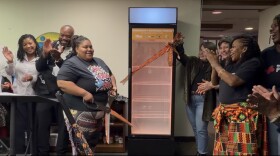TV and film can be powerful mediums — especially for connecting people to lives or worlds different from their own. Historically, these representations have been mostly damaging for transgender people and experiences.
Filmmaker Sam Feder’s Netflix documentary Disclosure is an examination of the history of trans representation on screen. Executive produced by actor and activist Laverne Cox, Disclosure also features other leading trans creators and thinkers such as Lilly Wachowsi, Yance Ford, Mj Rodriguez and Chaz Bono. They all share their perspectives on trans representation and how it has affected their lives.
Trans and non-binary representation has increased in mainstream media culture, but Disclosure came out as Black trans lives have been highlighted and included in the Black Lives Matter movement, pivoting people's collective consciousness toward these issues.
"It came out at an interesting time and a time when people are so open-hearted and people want to learn and people want to know what they need to unlearn," notes Feder. "So being able to contribute to this conversation is so meaningful and not lost on us at all what an honor that is."
And while it may have come out at just the right time to tap into a wider audience, Feder had been thinking about making the film for decades.
Feder says he was inspired by The Celluloid Closet, a film about gay and lesbian representation in Hollywood; and Ethnic Notions, a film that examines Black people's representation in film and Hollywood. He says both changed his understanding of our relationship to representation and media, and wanted to see the same critical look for trans people.
"I was changed by the way that the slightest shift of the lens, who you're centering in a story, completely changes how you understand history," Feder explains.
"I was changed by the way that the slightest shift of the lens, who you're centering in a story, completely changes how you understand history."
Disclosure also serves as a history of film. It features clips from as early as a 1914 D.W. Griffith film, to Yentl, Boys Don't Cry, and the FX show Pose.
With no books or previous works to base his film on, Feder spent years collecting material, research, and as many conversations with other trans people as possible.

"It was invigorating! It was a lot of work. I love doing research, I love doing archival research ... Collecting it, searching for things and then organizing it and looking at the patterns — I just find endlessly fascinating," says Feder.
This thorough examination of films and television spans from triggering to celebratory. Disclosure helps teach viewers how to look at trans portrayals with new accountability and understanding.
"It felt really important to me to not demonize anyone but to believe that people don't know what they don't know and that there needs to be a conversation around these issues, around accountability held with love, delivered with love and context," Feder explains.
"We can have a love/hate relationship with this material and it's OK! And I think that was part of what I also wanted a non-trans audience to experience," he adds.
Disclosure doesn't only feature trans thinkers and creatives on camera, but every key position on set was influenced by a trans person. If a trans person couldn't be hired or found for a job, Feder notes they made sure to mentor a trans person in the film production.
"A beautiful story could be told about trans representation by non-trans people, but it wouldn't be the same as this."
"A beautiful story could be told about trans representation by non-trans people, but it wouldn't be the same as this," explains Feder. "And I think you sense it. I think you feel it in the intimacy of the stories. I think you feel it in the way the narrative unfolds."
This documentary has certainly added to the visibility of the trans movement, but Feder notes visibility is not the goal. The goal is to have greater representation and inclusion from the beginning.
"I really do want to urge people that until we live in a time that all is fair and equal, we have to prioritize people who have a stake in the game," he says. "People who have a stake in the game need to be telling the stories — let us tell the stories before you tell them for us."






